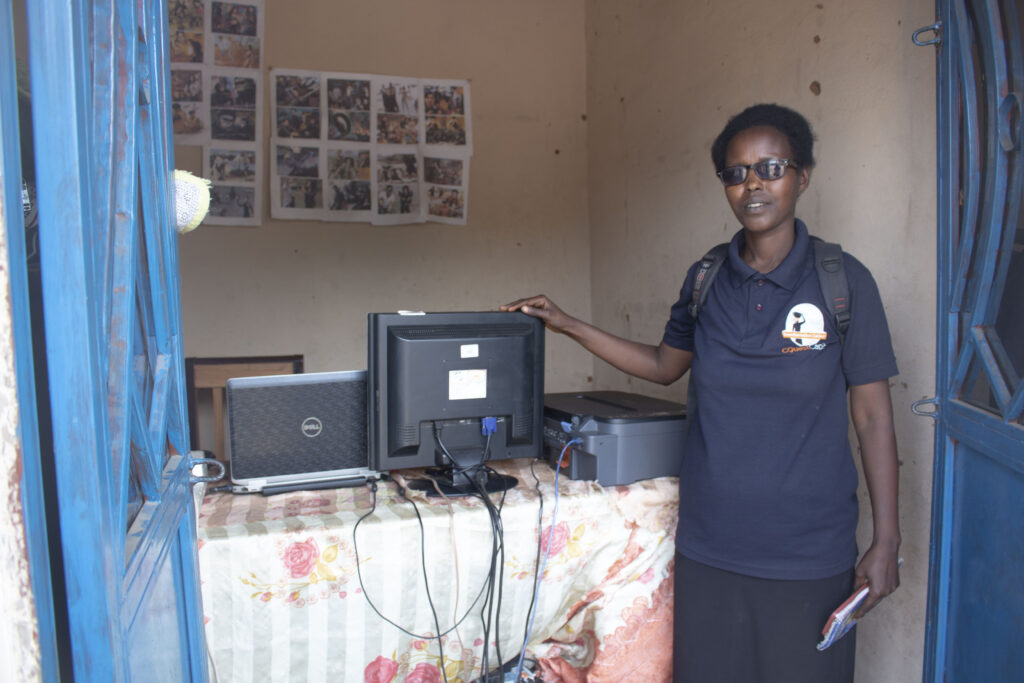Changing the Narrative for Future Farmers and Restoring Soil Fertility in Burundi
Clarté Nshimirimana, a 33-year-old farmer and mother of four, resides in Burundi’s Mitakataka Hill in the Bubanza Commune. Two years ago, she embarked on a transformative journey with the Soil Fertility Stewardship Project (PAGRIS).
The program was introduced to Clarté’s community through informative hill meetings where PAGRIS staff explained the project’s objectives and approach, sparking her interest in sustainable agriculture.
As a young woman eager to learn, Clarté actively participated in PAGRIS’ training sessions, which emphasized good farming practices such as soil protection and restoration.
Clarté learned about contour farming, cover cropping, agroforestry, and the use of lime and fertilizers – crucial techniques for sustainable agriculture that she quickly applied to her own farm. These techniques reduce soil erosion, enhance water retention, and improve soil fertility. Cover crops and agroforestry add organic matter to the soil, stabilize slopes, and provide additional resources, such as fodder and firewood.
Starting with just 1.5 kilograms (kg) of maize seed planted on seven ares (0.07 hectares) of her family land, Clarté produced an impressive 200 kg of maize. Encouraged by her success, she then introduced contour lines onto her farm and applied fertilizers. This improved approach enabled her to cultivate an intercrop of maize and soybean on half a hectare of land, yielding 700 kg of maize and 200 kg of soybeans. She sold 600 kg of maize at 1,800 Burundi Francs (BIF) per kg (around U.S. $0.62 per kg, totaling about U.S. $375) and 180 kg of soybean at 2,500 BIF per kg (around U.S. $0.86 per kg, totaling about U.S. $154.80), clearly demonstrating the benefits of techniques from PAGRIS’s training that Clarté adopted, including crop expansion and diversification.
With the earnings from her produce, Clarté has even established another business venture: a studio equipped with a laptop, a sound system for music production, a printer, and a camera for taking passport pictures. This studio generates additional daily income for her family and has also inspired local youth, all thanks to Clarté’s improved farming income.

Clarté displays her studio, showing the financial benefits of adopting PAGRIS farming techniques.
Historically, farming in Clarté’s community was shunned by youths. This negative perception stemmed from the demanding physical labor, the low status associated with agricultural work, and limited financial returns. Since many young people viewed farming as a low-paying and strenuous job, they preferred to seek opportunities in urban areas and in other sectors, where they believed they could earn quicker and more substantial incomes.
However, Clarté’s success is changing this narrative. Her achievements in farming, supported by training in modern agricultural practices by PAGRIS, have shown that farming is a viable and potentially lucrative venture. Young people in her community have seen the tangible benefits of sustainable farming: improved yields, increased income, and new opportunities for economic diversification.
Clarté’s story has inspired five young individuals to take up farming after realizing that agriculture could offer financial stability and personal fulfillment. They have since improved their living conditions, their homes now being connected to electricity and water. These young individuals have become role models, encouraging others to pursue productive activities rather than idling or seeking urban employment elsewhere. “One of these five young people, Nobampa Maombi, took up farming as a profession following my coaching sessions and what he saw in my field. He started growing soybeans and harvested 200 kg, and later, increased to 500 kg. Today he’s the one influencing other young people to leave delinquency behind and take up farming or other income-generating activities,” Clarté remarked.
As PAGRIS continues to foster agriculturally sustainable farming techniques and land management, stories like Clarté’s highlight how these positive impacts reshape local perceptions of agriculture, demonstrating that modern, sustainable farming can offer substantial economic benefits and opportunities for youth in Burundi.
The Soil Fertility Stewardship Project (PAGRIS), is funded by the Embassy of the Kingdom of the Netherlands in Burundi. The project promotes ecologically sustainable land management across Burundi. PAGRIS aims to reach 100,000 family farms and seeks to implement sustainable practices on 14,000 hectares of land by scaling the Integrated Farming Plan (PIP) approach.
AUTHORS
IFDC Staff
SOURCE
Originally published on Ifdc.org
PHOTOS
© IFDC